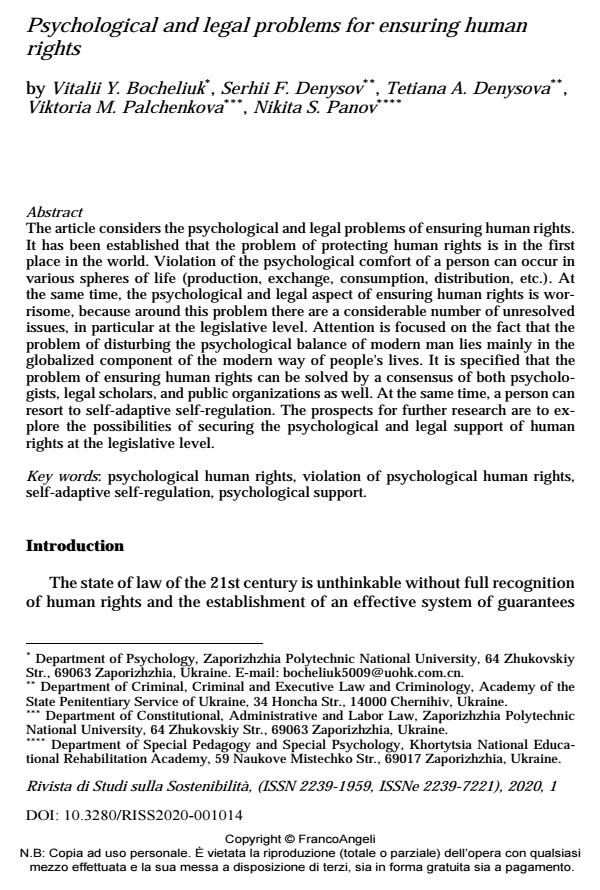Psychological and legal problems for ensuring human rights
Journal title RIVISTA DI STUDI SULLA SOSTENIBILITA'
Author/s Vitalii Y. Bocheliuk, Serhii F. Denysov, Tetiana A. Denysova, Viktoria M. Palchenkova, Nikita S. Panov
Publishing Year 2020 Issue 2020/1
Language English Pages 11 P. 235-245 File size 109 KB
DOI 10.3280/RISS2020-001014
DOI is like a bar code for intellectual property: to have more infomation
click here
Below, you can see the article first page
If you want to buy this article in PDF format, you can do it, following the instructions to buy download credits

FrancoAngeli is member of Publishers International Linking Association, Inc (PILA), a not-for-profit association which run the CrossRef service enabling links to and from online scholarly content.
The article considers the psychological and legal problems of ensuring human rights. It has been established that the problem of protecting human rights is in the first place in the world. Violation of the psychological comfort of a person can occur in various spheres of life (production, exchange, consumption, distribution, etc.). At the same time, the psychological and legal aspect of ensuring human rights is worrisome, because around this problem there are a considerable number of unresolved issues, in particular at the legislative level. Attention is focused on the fact that the problem of disturbing the psychological balance of modern man lies mainly in the globalized component of the modern way of people's lives. It is specified that the problem of ensuring human rights can be solved by a consensus of both psychologists, legal scholars, and public organizations as well. At the same time, a person can resort to self-adaptive self-regulation. The prospects for further research are to explore the possibilities of securing the psychological and legal sup-port of human rights at the legislative level.
Keywords: Psychological human rights, violation of psychological human rights, self-adaptive self-regulation, psychological support.
- Akopian A.B. (2017). Psychological well-being of personality and psychosocial stress. Feniks, Odesa.
- Anokhin Yu.V. (2017). Ensuring human rights. Barnaul Law Institute, Barnaul.
- Butkevych O.V. (2004). Human rights. Znannia Ukrainy, Kyiv.
- Constitution of Ukraine. (1996). -- Available from: https://zakon.rada.gov.ua/laws/show/254%D0%BA/96-%D0%B2%D1%80.
- Convention for the protection of human rights and fundamental freedoms. (1950). -- Available from: https://www.echr.coe.int/Documents/Convention_ENG.pdf.
- Dodonova V.I., Dodonov R.A., Aleksandrova O.S., Popovich O.V., Omelchenko Y.V. (2019). Strategy and tactics of behaviour of subjects and objects of historical trauma. Analele Universitatii din Craiova – Seria Istorie, 36(2): 153-164.
- Hrytsiuk I.M. (2017). Psychophysiology. Vezha-Druk, Lutsk.
- Karmaza O.O., Sarana S.V., Fedorenko T.V., Gurzhii T.O., Nefedova A.V. (2018). The protection of civil rights and interests in the court. Journal of Advanced Research in Law and Economics, 9(8): 2622-2630.
- Komarov V.V. (2008). European convention on the protection of human rights and fundamental freedoms and practice of justice. Kharkov is Legal, Kharkov.
- Kovalenko V.I. (2016). Philosophical and legal aspects of the freedom of a person. Philosophy of Law, Moscow.
- Kushnir V.M. (2018). Theoretical and legal principles of administration of military service in the armed forces of Ukraine. Administrative Law and Administrative Process, Information Law, Kiev.
- Lewandowski С.М. (2018). Economic sanctions in international public law. Part II: grounds and limitation. Pravova Derzhava, Kyiv.
- Marko J.R. (2016). The right to surrogacy: advanced understanding of the problem. Lviv Polytechnic, Lviv.
- Rabinovich P.M. (2016). The rule of law principle: problems of theory and practice. Spolom, Lviv.
- Roy O.V. (2018). The subject matter and content of a public law dispute in administrative proceedings. Institute of State and Law, Kiev.
- Rozov V.I. (2005). Adaptive anti-stress psychotechnology. Kondor, Kyiv.
- Universal Declaration of Human Rights. (1948). -- Available from: https://www.un.org/en/universal-declaration-human-rights/.
- Voloshko N.І. (2015). Psychological exercises for the development of motivation of healthy lifestyle in the educational process. Aksioma, Kamianets-Podilskyi.
- Zelynskyi S.A. (2009). Controlling the psyche through manipulation. subliminal mechanisms of manipulative influence on the psyche of an individual and the masses with the aim of programming to perform specified actions. Skyfyia, St. Petersburg.
- Zhilavskaya I.V., Ivanova T.V., Gayazov A.S., Vladimirova T.N. (2018). Media education and democracy. Espacios, 39(20): 1.
- Zinchenko V.P. (2007). Tolerance in immediacy: News or psychological tradition. TEIS, Moscow.
- O conceito de “povo” no romance The Nomads: Despair [Os nômades: desespero] de I. Yessenberlin Aigerim Dairbekova, in Bakhtiniana: Revista de Estudos do Discurso e67624p/2025
DOI: 10.1590/2176-4573p67624 - The Concept of “People” in the Novel The Nomads: Despair by I. Yessenberlin Aigerim Dairbekova, in Bakhtiniana: Revista de Estudos do Discurso e67624p/2025
DOI: 10.1590/2176-4573e67624
Vitalii Y. Bocheliuk, Serhii F. Denysov, Tetiana A. Denysova, Viktoria M. Palchenkova, Nikita S. Panov, Psychological and legal problems for ensuring human rights in "RIVISTA DI STUDI SULLA SOSTENIBILITA'" 1/2020, pp 235-245, DOI: 10.3280/RISS2020-001014